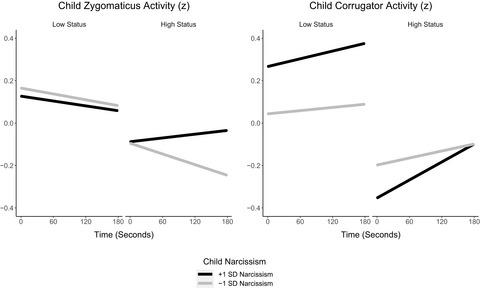Our official English website, www.x-mol.net, welcomes your
feedback! (Note: you will need to create a separate account there.)
Climbing up or falling down: Narcissism predicts physiological sensitivity to social status in children and their parents
Developmental Science ( IF 3.1 ) Pub Date : 2020-11-09 , DOI: 10.1111/desc.13062 Stathis Grapsas 1 , Jaap J A Denissen 1, 2 , Hae Yeon Lee 3 , Peter A Bos 4 , Eddie Brummelman 5
Developmental Science ( IF 3.1 ) Pub Date : 2020-11-09 , DOI: 10.1111/desc.13062 Stathis Grapsas 1 , Jaap J A Denissen 1, 2 , Hae Yeon Lee 3 , Peter A Bos 4 , Eddie Brummelman 5
Affiliation

|
Children's narcissism may be rooted in sensitivity to social status (i.e., prominence, respect, and influence in a social group), and this sensitivity might be shared with parents. Testing this idea, a randomized experiment examined how children with high narcissism levels and their parents respond to gains and losses of social status. On a simulated social media platform, children (N = 123, ages 8–13) competed with fictitious peers for status and were randomly assigned to gain or lose status. Unbeknownst to children, parents viewed the course of the task. Children's and parents' affective reactions during the task were measured with facial electromyography, which detects spontaneous facial muscle activity linked to positive affect (i.e., zygomaticus major activity, involved in smiling) and negative affect (i.e., corrugator supercilii activity, involved in frowning). Children with higher narcissism levels showed steeper increases in negative affect during status loss and steeper increases in both positive and negative affect during status gain. Their parents mirrored the steeper increase in positive affect during their child's status gain, but they did not mirror the increase in negative affect. These results suggest that children with high narcissism levels and their parents show intensified affective-motivational responses to children's status-relevant experiences. These responses may be transmitted from one generation to the other (e.g., genetically or through parent–child socialization).
中文翻译:

爬上或跌倒:自恋预测儿童及其父母对社会地位的生理敏感性
儿童的自恋可能源于对社会地位的敏感性(即在社会群体中的突出、尊重和影响),而这种敏感性可能会与父母分享。测试这个想法,一项随机实验检验了高度自恋的儿童及其父母如何应对社会地位的得失。在模拟社交媒体平台上,儿童(N = 123,8-13 岁)与虚构的同龄人竞争地位,并被随机分配获得或失去地位。孩子们不知道,父母看到了任务的过程。使用面部肌电图测量儿童和父母在任务期间的情感反应,可检测与积极情绪(即颧骨主要活动,涉及微笑)和消极情绪(即皱眉肌活动,涉及皱眉)相关的自发面部肌肉活动. 具有较高自恋水平的儿童在地位丧失期间表现出负面情绪的急剧增加,而在地位获得期间积极和消极情绪的急剧增加。他们的父母反映了在孩子地位提升期间积极情绪的急剧增加,但他们没有反映消极情绪的增加。这些结果表明,自恋程度高的儿童及其父母对儿童的地位相关经历表现出强烈的情感-动机反应。这些反应可能会从一代传给另一代(例如,遗传或通过亲子社会化)。
更新日期:2020-11-09
中文翻译:

爬上或跌倒:自恋预测儿童及其父母对社会地位的生理敏感性
儿童的自恋可能源于对社会地位的敏感性(即在社会群体中的突出、尊重和影响),而这种敏感性可能会与父母分享。测试这个想法,一项随机实验检验了高度自恋的儿童及其父母如何应对社会地位的得失。在模拟社交媒体平台上,儿童(N = 123,8-13 岁)与虚构的同龄人竞争地位,并被随机分配获得或失去地位。孩子们不知道,父母看到了任务的过程。使用面部肌电图测量儿童和父母在任务期间的情感反应,可检测与积极情绪(即颧骨主要活动,涉及微笑)和消极情绪(即皱眉肌活动,涉及皱眉)相关的自发面部肌肉活动. 具有较高自恋水平的儿童在地位丧失期间表现出负面情绪的急剧增加,而在地位获得期间积极和消极情绪的急剧增加。他们的父母反映了在孩子地位提升期间积极情绪的急剧增加,但他们没有反映消极情绪的增加。这些结果表明,自恋程度高的儿童及其父母对儿童的地位相关经历表现出强烈的情感-动机反应。这些反应可能会从一代传给另一代(例如,遗传或通过亲子社会化)。











































 京公网安备 11010802027423号
京公网安备 11010802027423号